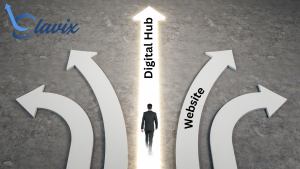In an increasingly digital world, having a strong online presence is crucial for any business. But not just any online presence—a well-designed digital hub can be a game-changer for connecting with prospects, building your brand, and driving revenue. A digital hub acts as a centralized platform that combines your branding, calls to action, and key messaging into a streamlined experience for your audience.
Here are the top five reasons why your business needs a digital hub and how it can transform the way you engage with clients and grow your brand.
1. Improved Lead Management
One of the main advantages of a digital hub is the ability to capture, track, and manage leads more effectively. Unlike traditional websites that often lack focus, a digital hub is designed to guide visitors toward specific actions, such as sharing contact information or scheduling a consultation. By providing an intuitive, action-oriented experience, your hub turns casual visitors into qualified leads.
Why it matters: Effective lead management is key to growing your business. A digital hub collects valuable contact information and interaction data, giving you deeper insights into your audience and enabling more personalized follow-up strategies. With built-in lead capture forms and tracking, your hub helps you stay organized and on top of every potential client.
Example: A business consultant might use a digital hub to invite visitors to sign up for a free assessment, capturing leads for further engagement.
2. Enhanced Brand Presentation
A digital hub acts as a powerful extension of your brand. By incorporating your brand’s colors, logo, messaging, and voice, your hub becomes a cohesive and professional representation of your company. It provides a single, polished destination where prospects can experience your brand identity without distractions or competing information.
Why it matters: Consistent branding builds trust and recognition, both essential for establishing credibility in your industry. When visitors see your brand presented clearly and cohesively, they’re more likely to view your business as a trusted authority. A digital hub offers a clean, organized experience that reinforces your brand’s core values and messaging in every interaction.
Example: A real estate agent could use their digital hub to feature their logo, client testimonials, and a branded welcome video, creating a memorable first impression for new clients.
3. Streamlined Communication
Clear, efficient communication is key to maintaining strong client relationships and moving prospects along the sales journey. A digital hub brings together all the essential information in one place, making it easy for visitors to find what they need quickly. From contact details and service information to
scheduling options and FAQs, a hub streamlines communication by reducing the need for back-and-forth emails and calls.
Why it matters: When clients and prospects can easily access information and take action, they’re more likely to stay engaged with your business. A well-organized hub not only saves time for your team but also enhances the overall customer experience, leaving prospects with a positive impression and encouraging future interactions.
Example: A financial advisor could use their digital hub to display services, provide answers to common questions, and allow clients to book appointments, all in one place.
4. Real-Time Engagement
In today’s fast-paced market, real-time engagement is crucial for capturing attention and converting interest into action. A digital hub enables you to interact with prospects instantly, through interactive elements like live chat, social media links, and real-time notifications. This immediate responsiveness can make a big difference in retaining visitors and motivating them to take the next step.
Why it matters: Prospects are more likely to convert when they can receive answers to their questions or access content immediately. Real-time engagement features, such as notifications and chat options, provide a direct line of communication, helping you connect with your audience on a personal level and increasing the likelihood of conversions.
Example: An e-commerce business could use a live chat on their digital hub to assist visitors in real-time, answering questions and providing product recommendations.
5. Revenue Growth
Ultimately, the purpose of any digital tool is to support business growth, and a digital hub is no exception. By improving lead management, enhancing brand presentation, streamlining communication, and enabling real-time engagement, a digital hub sets the stage for increased revenue. Each interaction within the hub is carefully designed to move prospects closer to conversion, resulting in more clients, sales, and overall business growth.
Why it matters: A digital hub turns your online presence into a strategic asset. Every feature—from lead capture forms to CTAs—is designed to support your bottom line, helping you make the most of every visitor interaction. With a digital hub, you’re not just presenting information—you’re creating a revenue-generating tool that integrates seamlessly with your sales and marketing efforts.
Example: A health and wellness coach could use their digital hub to guide prospects through a series of CTAs that lead to booking paid sessions, signing up for classes, or purchasing products.
Ready to Build Your Digital Hub?
A branded digital hub is more than just an online presence; it’s a dynamic platform that drives engagement, streamlines communication, and enhances revenue. By providing a centralized space for your brand and CTAs, a digital hub turns each visitor interaction into an opportunity for growth.
If you’re ready to experience the power of a digital hub for your business, contact us today. Let us help you create a hub that captures attention, builds trust, and drives meaningful action from your audience.











